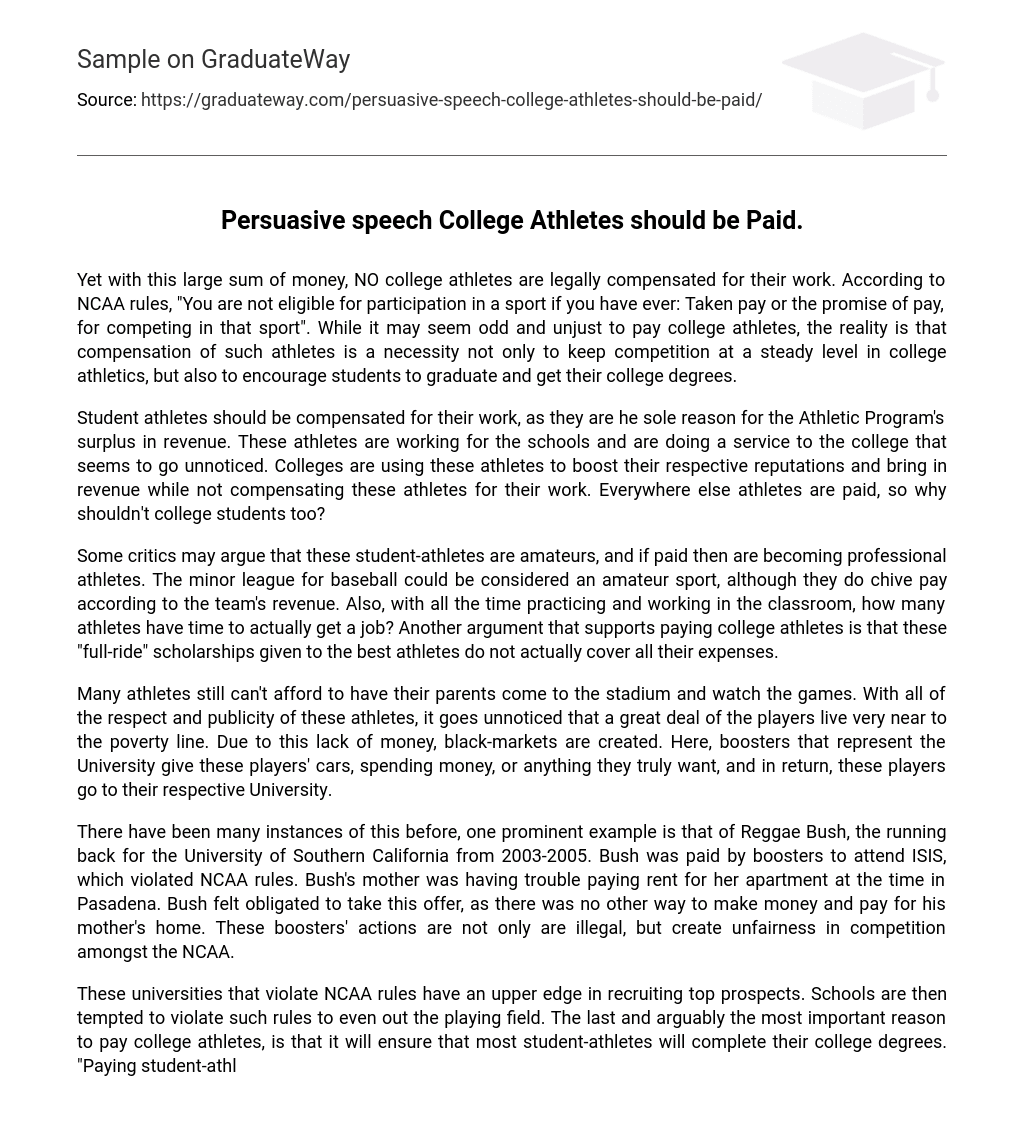Despite having a substantial amount of money, college athletes do not receive any legal compensation for their work. As per NCAA regulations, participating in a sport is forbidden if there has been any form of payment or promise of payment for competing in that sport. Although it may appear peculiar and unfair, paying college athletes is imperative to maintain a consistent level of competition in college athletics and motivate students to graduate and obtain their college degrees.
Student athletes deserve to be paid for their efforts since they are the primary reason for the surplus in revenue generated by the Athletic Program. These athletes are essentially providing a service to the college, and this contribution often goes unnoticed. Colleges rely on these athletes to enhance their reputations and bring in revenue, without providing them any compensation for their work. Considering that athletes are compensated in other settings, it is only fair that college students should be as well.
Some critics argue that paying student-athletes would turn them into professional athletes, as they are currently considered amateurs. Minor league baseball is seen as an amateur sport, even though players are paid based on team revenue. Additionally, due to the extensive time commitment of practicing and attending classes, many athletes struggle to find employment. Another justification for paying college athletes is that “full-ride” scholarships provided to the top athletes do not fully cover their expenses.
Despite the respect and publicity they receive, many athletes are unable to afford their parents’ attendance at their games. It is often overlooked that a significant number of players live close to poverty. Consequently, black markets flourish where boosters, acting on behalf of the University, provide players with cars, spending money, or whatever they desire. In exchange, these players commit themselves to their respective University.
There have been numerous cases of this occurring in the past, with one notable instance being that of Reggae Bush, the University of Southern California’s running back from 2003-2005. Boosters offered Bush payment to attend ISIS, violating NCAA regulations. At that time, his mother was struggling to afford rent for her apartment in Pasadena. Bush felt compelled to accept this opportunity since it was the only means to earn money and support his mother’s housing. Not only are these boosters’ actions illegal, but they also create an unfair advantage in NCAA competition.
The universities violating NCAA rules have an advantage in recruiting top prospects and may be tempted to do so in order to level the playing field. One crucial reason for paying college athletes is to ensure that most student-athletes will complete their degrees. “By providing payment to student-athletes, it gives them an incentive to remain in school and successfully finish their degree programs instead of leaving early for professional leagues.” This leads us to the question: should college athletes receive payment? If athletes are compensated for their performance, they can cover expenses that scholarships may not fully cover and will be more motivated to complete their education. Despite the NCAA’s emphasis on prioritizing students over athletes, it seems that more popular athletes tend to leave early for professional opportunities. In college basketball, many freshman stars are commonly referred to as “one and done” players – completing only one year of college before transitioning early into professional leagues with the goal of earning money as quickly as possible.
The University’s hypocrisy is evident in its failure to pay athletes while simultaneously supporting college players who leave for the professional league early. One proposed solution is for universities to provide a consistent flat rate payment to all college athletes for three years, with a subsequent raise for senior athletes. This monetary incentive will encourage students to prioritize their education and earn their degrees.
Financially compensating college athletes may appear unjust, but it is essential for maintaining fair competition and motivating students to complete their degrees. Currently, many college athletes already receive illicit payments, creating an illegal black-market and placing compliant universities at a disadvantage. Universities are exploiting these athletes by depriving them of their rightful earnings. Therefore, it is imperative to pay college athletes!





